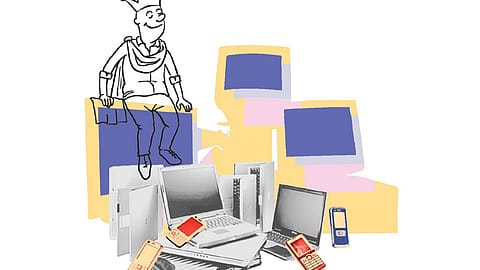There's life in my cellphone yet!
Unlocking the value in your old tech gadgets just got easier.

E-COMMERCE IS OLD HAT. Recommerce or ‘reverse commerce’—trading in products over the Net or physical distribution channels—just got hip. The emergence of tech recommerce companies has been as rapid as mobile phone, laptop, PC, or television swaps by consumers. Earlier, such trading was limited to classifieds sites and unorganised players. But keeping upwardly mobile consumers in mind, online players such as Budli and Atterobay and brick-and-mortar stores like YNew are cashing in on ‘trading in to trade up’. That means sellers ‘trading in’ used or refurbished gadgets, and next-rung buyers ‘trading up’ to better, affordable gadgets.
“Even as technology makes further inroads, there are limited options to sell gadgets and obtain a fair value for it. This is where we come in,” says Budli founder Rohit Bagaria. On a recommerce site, a seller is offered a quote based on the product’s condition, which he can accept or ignore. If he accepts, the amount is transferred to him within a few days. The portals also offer product pickups. (While Atterobay buys and sells, Budli only buys.)
Nitin Gupta, CEO of e-waste recycler Attero (Atterobay is part of Attero), estimates the global recommerce market—limited to electronic devices so far—to be more than $57 billion
(Rs 3.6 lakh crore) and growing at 20%-plus annually. Atterobay has recycled half a million phones.
Adds YNew founder Dasradh Ram Nutakki, “About 2.4 million products entered the recommerce market in 2012.” He predicts a rise to 7.5 million by 2016. Nearly Rs 60 lakh worth of products was traded at YNew in the last three quarters. The bulk comprised smartphones, tablets, and laptops. “Going ahead, it will be important to see how the value proposition of these sites is better than traditional retailers,” says Rajat Wahi, partner–consumer markets and retail, at consultancy KPMG.
The recommerce phenomenon has, predictably, caught the fancy of India’s young lot. Most of the recommerce traffic is being driven by consumers in tier II cities and rural areas.
“Recommerce has also begun affecting consumers’ initial purchase decisions, since they take into account an item’s resale value into the overall cost,” adds Gupta.